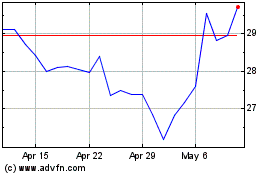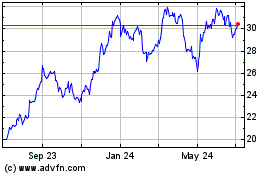UBS Names Michael Baldinger as First Chief Sustainability Officer
May 05 2021 - 1:21PM
Dow Jones News
By Dieter Holger
UBS Group AG on Wednesday named Michael Baldinger as the Swiss
bank's first chief sustainability officer, effective June 1, a role
that will steer its goal to reach net-zero greenhouse-gas emissions
by 2050 as big financiers re-align their portfolios to combat
climate change.
Mr. Baldinger joined the bank in 2016 as head of sustainable and
impact investing for UBS Asset Management and was previously the
chief executive of sustainable-investment pioneer and research firm
RobecoSAM. In his new role, reporting to UBS Asset Management
President Suni Harford, he will have more power to oversee a number
of challenges to boost sustainable investments and activities.
"We aim to extend the group's leadership in sustainability and
take another step toward meeting our net-zero ambitions," Ms.
Harford said.
Mr. Baldinger's promotion comes at a time when UBS and the
financial sector is placing greater importance on sustainability
and environmental, social and governance-based investing
strategies, as governments, investors and the public call on banks
to mobilize their finances to meet the Paris climate accords. The
international agreement made in 2015 aims to keep global warming
well-below 2 degrees Celsius and achieve a climate-neutral world by
the mid-century.
Big U.S. banks Wells Fargo & Co., Bank of America Corp. and
Citigroup Inc. pledged earlier this year to reach net-zero
greenhouse-gas emissions across their finances by 2050. BlackRock
Inc., the world's largest fund manager, has also said its
investments would reach net-zero by 2050, which involves pressuring
companies to change course.
UBS, which has more than $4 trillion in invested assets, is
already one of the world's top managers of sustainability funds and
publishers of ESG research, but it plans to move even more
aggressively into the space. In September, UBS said it would
recommend sustainable investments over traditional options to its
clients around the world, including for retirement plans. More
wealth managers could follow its lead, analysts say.
Later this year, Mr. Baldinger will likely be involved in
unveiling the bank's climate action plan, which will set
science-based emissions targets and intermediate goals on the road
to net-zero. The most difficult area to cut emissions for UBS are
its scope 3 emissions, which are contained in the products
companies sell. For banks like UBS, that includes their
financing.
Sustainable investments can also bring profit to fund managers.
For instance, exchange-traded funds with sustainability mandates
around environmental and social issues carry higher fees on average
than standard ETFs, according to data from FactSet.
UBS's most recent first-quarter earnings topped Wall Street's
expectations across all its divisions but were overshadowed by a
surprise $774 million hit from the collapse of Archegos Capital
Management. Operating profit from its asset-management business
rose to $227 million from $157 million a year ago, buoyed by
inflows.
Write to Dieter Holger at dieter.holger@wsj.com;
@dieterholger
(END) Dow Jones Newswires
May 05, 2021 13:06 ET (17:06 GMT)
Copyright (c) 2021 Dow Jones & Company, Inc.
UBS (NYSE:UBS)
Historical Stock Chart
From Apr 2024 to May 2024

UBS (NYSE:UBS)
Historical Stock Chart
From May 2023 to May 2024
